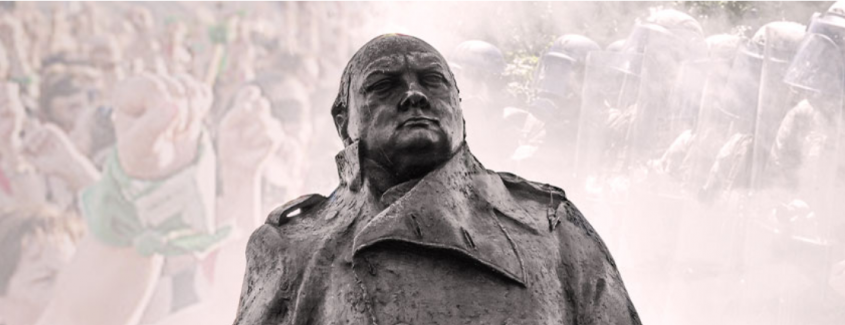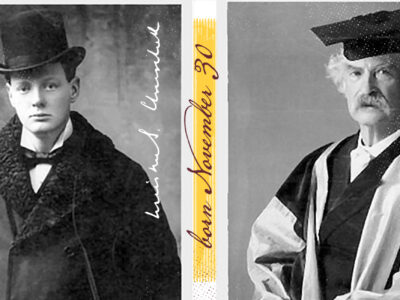
The current worldwide protests against racial injustice and inequality spurred by the death of George Floyd in Minneapolis on May 25 have prompted attacks on individuals who sold and owned slaves and defended the abominable practice of slavery. It has led to the toppling of statues of Christopher Columbus, English slave trader Edward Colston (1636-1721), and Confederacy president Jefferson Davis and to efforts to remove the 60-foot tall statue of Robert E. Lee in Richmond, Virginia. It has also included assaults on proponents of imperialism, most notably Winston Churchill.
Last week Churchill’s statue in London’s Parliamentary Square was defaced by a protestor who spray-painted “was a racist” across its base. Protestors have called for taking down the statue, which has been boarded up to protect it. British Prime Minister Boris Johnson admitted that Churchill expressed views on race that are “unacceptable” today but argued that Churchill had saved the nation from Adolf Hitler’s “fascist and racist tyranny.” Churchill’s granddaughter Emma Soames insisted that he held some opinions that “now are regarded as unacceptable but weren’t necessarily” seen that way in his day.
A 2002 BBC poll named Churchill the greatest Briton of all time. He beat out William Shakespeare and Charles Darwin and continues to be widely considered one of his nation’s most influential citizens. He is frequently described as almost single-handedly slaying the dragon of totalitarianism and saving Western civilization from Hitler’s diabolical schemes.
On the other hand, Churchill was one of the most ardent defenders of the British empire and strongest opponents of India’s independence. His views of race and imperialism have often been rightly criticized as retrogressive, racist, repressive, and repulsive.
Ishaan Tharoor, a “Washington Post” columnist, contends that there is a dark side to Churchill’s legacy as a “freedom fighter” who boldly “withstood Nazism and helped save Western liberal democracy.” Many non-Westerners view him as “a grotesque racist and a stubborn imperialist” who was “on the wrong side of history.”
Moreover, in Churchill’s Secret War: The British Empire and the Ravaging of India during World War II, Madhusree Mukerjee assigns Churchill the primary blame for the horrific famine that killed three million people in Bengal in 1943. By diverting India’s resources to fight Germany and Japan, Mukerjee charges, Churchill produced scarcity and inflation in the British-controlled country. Tharoor accuses Churchill of being indifferent to the plight of the Bengalese and even mocking their suffering.
Arthur Herman counters in Gandhi and Churchill that Mukerjee ignores “all Churchill, his Cabinet, and the entire British Empire did to aid the starving state of Bengal.” He insists that Britain shipped hundreds of thousands of tons of grain from around the world to Bengal. As terrible as the famine was, Herman maintains, without Churchill, “it would have been far worse.”
Churchill frequently repeated the arguments he made in a 1931 speech titled “Our Duty in India.” Citing a basic argument numerous imperialists used, he claimed that Britain had lifted 350 million people to “a civilisation and to a level of peace, order, sanitation and progress far above anything they could possibly have achieved themselves or could maintain.”
Churchill opposed giving complete independence to India for two basic, interrelated reasons: he believed that the Indian people were not prepared to govern themselves, and if the British withdrew, civil disorder and bloodshed would erupt. If British authority was destroyed, Churchill warned, the efficient military, administrative, medical, hygienic, judicial, transportation, irrigation, public-works, and famine-prevention services that the British provided, “upon which the Indian masses depend for their culture and progress, will perish with it. India will fall back quite rapidly … into the barbarism and privations of the Middle Ages.”
Churchill claimed that handing over political power to the Brahmins who were committed to keeping 60 million fellow countrymen (the untouchables) “perpetually and eternally in a state of sub-human bondage” would be tragic. Churchill also feared that India’s five million Christians would not be treated equally under the law if the British withdrew.
Worst of all, Churchill warned, if the British left, warfare was likely to erupt between Hindus and Muslims in India. Churchill correctly predicted the strife between Hindus and Muslims that led to the death of 5,000 people in the Calcutta riots of August 1946, the separation of India and Pakistan in 1947, and the assassination of Mahatma Gandhi the next year.
Churchill did support Indians’ self-government. He argued, however, that Indians must be prepared for national self-governance by first exercising responsibility in the nation’s provincial governments.
Churchill was powerfully influenced by the imperialist, racist, sexist ethos of his age. He embraced the mores of his era, socialization, and religious culture. In defending the benefits of the British empire, he often affirmed values that clashed with Christianity’s emphasis on service, sacrifice, and racial and gender equality. Even when many of his contemporaries in the 1930s, 1940s, and 1950s, including Franklin Roosevelt, rejected this imperialist worldview, Churchill clung tenaciously to it.
Churchill defended hierarchical social divisions and assumed that great nations, especially Britain, had a responsibility to govern and uplift “more primitive” countries. No doubt he genuinely believed that British rule and influence benefitted Asians, Africans, and other “less civilized” people. This, however, does not justify his efforts to delay giving self-government to these British “possessions.” Sadly, his actions contributed to the oppression of millions throughout the British empire.
While recognizing his flaws, we should, however, evaluate Churchill’s historical context and scrutinize his arguments. And we should remember that without Churchill, Britain might have capitulated to the Nazis as France did and that world history would be radically different. In leading Britain during World War II, Churchill acted with consummate courage and arguably had the greatest impact on history of anyone in the twentieth century. For that, we owe him a great debt of gratitude.


